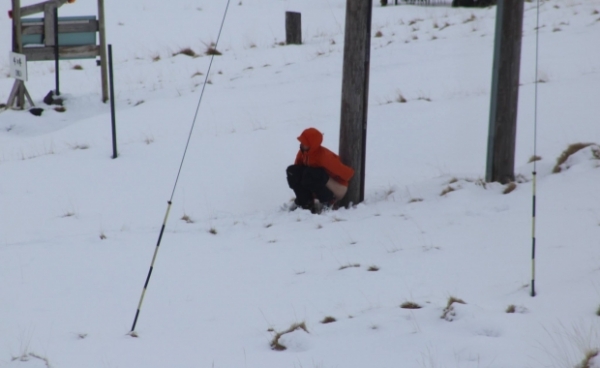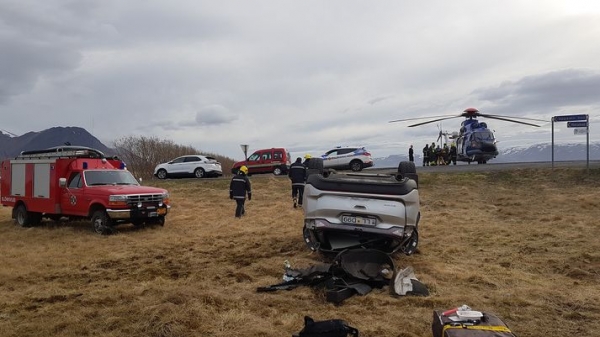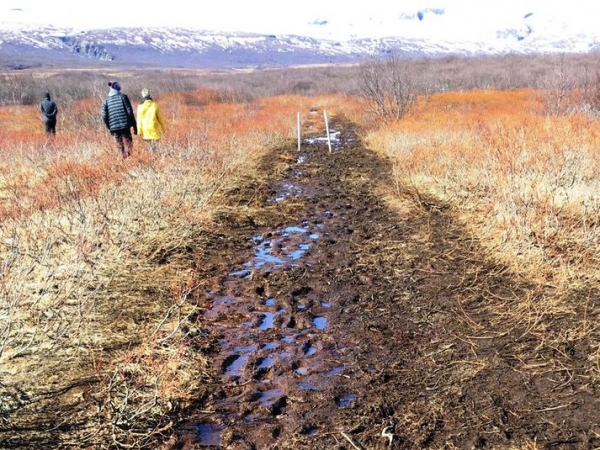In recent weeks we have seen news of angry protests against foreign visitors at popular tourism hotspots around Europe. From Venice to Barcelona locals have taken to the streets in attempts to reassert control over their communities. These protests have, understandably, caught the attention of people in the tourism industry and travellers alike.
A backlash in Iceland?
Here in Iceland we have also seen a number of stories of disrespectful, destructive or plain dumb behavior by foreign visitors. Some have interpreted these stories as either indicating a growing frustration among Icelanders against tourism or a sure sign that an angry backlash has already begun. Keeping in mind the rapid growth of the Icelandic tourism industry one could perhaps expect a backlash of this sort here in Iceland.
A recent article on the travel website The Culture Trip took the second approach, including Reykjavík on a list of 11 Angry Tourist Hotspots That Are Best Avoided This Summer:
Defecating in the open air, stealing road signs and even stealing a young lamb to be cooked on a barbecue are just some of the actions of tourists that have angered locals in Iceland. Tourism here has boomed since the 2008 financial crisis practically destroyed the local economy, yet recently, local residents in cities such as Reykjavik have struggled to cope with the social and environmental impact of the industry.
Bad tourist behavior

We at Iceland Insider have covered the kinds of the stories The Culture Trip mentions. This summer we have written 19 stories about various negative stories about foreign visitors, including the story of a group of men who stole and killed a lamb they intended to barbecue for dinner. The men were initially identified as American, but Police in East Iceland was unwilling to confirm the nationality of the men, saying men of different nationalities were in the group.
Read more: Group of travellers arrested as they were preparing to cook a lamb they had stolen, killed
The most recent example of these stories is the strange misadventure of a group of travellers who spent the night in a summer cabin they had broken into, and were surprised at the anger of the owner who arrived the next morning.
Read more: Foreign travellers commandeer a public roadside toilet, turn it into a storage locker
Many of these stories are clearly examples of outrageous behavior which has no excuses. The lamb killing is a good example. Others are primarily humorous. The story of travellers who commandeered a public lavatory to store their luggage is an example of these kinds of stories.
Read more: Farmer in S. Iceland fed up with disrespectful travellers treating his lawn as a public lavatory
Mistakes and accidents

In many other cases the root cause is clearly misunderstanding or honest mistakes. For example when a group of travellers created a new walking path in the slopes of a volcanic crater in North Iceland. Of course people should stay on marked walking paths, but it is understandable that people might not realize the damage they are doing when they create their own paths.
These negative stories should not be confused with stories of accidents. This summer we at Iceland Insider have written 34 stories of various accidents, including rollovers and stories of hikers who have been rescued. Fortunately most of these stories have a happy ending, although every single story which includes people suffering injuries or fatal accidents is a tragedy.
Why cover negative stories?

We at Iceland Insider have covered stories of bad behavior of visitors because we feel it is necessary to shine a light on problems, not least as a caution to others. We don't cover them to call out people or nations – we cover them because we feel it is helpful for others to know what kind of behavior to avoid. These kinds of stories should serve as cautionary tales.
We therefore also cover them because they are legitimate news. We need to keep in mind that Iceland is a small country, and these kinds of stories are extremely rare: Which is why they find their way into the news. Every single story of bad behavior by travellers we have covered has been the subject of significant discussion in local media. Following these stories helps us understand and track local attitudes to tourism.
Bad behavior and the angry backlash
Which brings us to the point about the angry backlash against this bad behavior. Or rather, the non-existing angry backlash.
The fact of the matter is that the Icelanders know that these stories are not representative of tourists as a group. People understand that a few bad apples don't represent the overwhelming majority of visitors who do everything right and treat nature with respect.
Has tourism caused problems? Sure, of course

While it is correct that anti-social, stupid or disrespectful behavior by foreign visitors has caught the attention of locals, causing anger and frustration (who would not be frustrated at discovering a random idiot going to the toilet on his front lawn? Or in the bushes in a public park?) it is also a fact that these stories have not caused a backlash against tourism or tourists.
The most recent poll revealed that 64% of Icelanders have a positive view of foreign travellers who visit Iceland, and just 10.4% view them negatively – a drop from 11.5% in 2016, despite the fact that the number of foreign travellers visiting Iceland this year is up as much as 40%, compared to the year before.
Read more: 64% of Icelanders positive toward foreign travellers, just 10.4% hold negative views
Polls show that despite the explosive growth in tourism in Iceland in the past years Icelanders continue to be overwhelmingly positive toward tourism. And what´s more, Reykjavík residents are particularly positive toward tourism. 67.5% of the residents of the Metropolitan area said they held positive views of foreign travellers.
There is therefore no factual basis to include Iceland on a list of places foreign visitors should avoid to stay clear of angry locals.
Read more: Overwhelming majority of Reykjavík locals continues to be positive toward growing tourism
Social and environmental impact of tourism

The Culture Trip is correct, however, to point out that Icelanders are struggling to cope with the impact a booming tourism industry has had on the economy, society and nature. But most Icelanders understand that the problems, like rising housing prices and lack of infrastructure at the popular tourist destinations, can be solved by public action. People blame the authorities, not the tourists, for lack of affordable housing or inadequate walking paths at waterfalls or the lack of public lavatories along Iceland's roads.
People also understand that while some foreign travellers have engaged in outrageous behavior, this behavior does not reflect foreign travellers as a group – or the nations of the travellers in question. When a French traveller is caught poaching in a salmon river, for example, people do not assume all foreign travellers are lawless vagabonds, or that all Frenchmen engage in poaching.
Locals are also concerned over other negative impacts of tourism: Things like price gouging and corrupt business practices. A good example of the former is the story of an overprized sandwich offered by a small café in N. Iceland. The story of a Reykjavík hotel which warned its guests not to drink the tap water, but instead buy the hotel's own branded bottled water is a good example of the latter.
Mutual respect
Iceland has perhaps been lucky. Iceland has not been hit with the waves of drunk revelers who have caused mayhem at many Mediterranean destinations, and with a few isolated exceptions the people who have visited Iceland have treated the country and the local population with respect. In return Icelanders have treated these visitors with the respect that one treats a guest.
Read more: Tourism’s social influence: Are we Icelanders likely to pick up any new bad habits?
This is at it should be, and we at Iceland Insider certainly hope this mutual respect will continue to characterize the interaction of the local population and our guests.
In recent weeks we have seen news of angry protests against foreign visitors at popular tourism hotspots around Europe. From Venice to Barcelona locals have taken to the streets in attempts to reassert control over their communities. These protests have, understandably, caught the attention of people in the tourism industry and travellers alike.
A backlash in Iceland?
Here in Iceland we have also seen a number of stories of disrespectful, destructive or plain dumb behavior by foreign visitors. Some have interpreted these stories as either indicating a growing frustration among Icelanders against tourism or a sure sign that an angry backlash has already begun. Keeping in mind the rapid growth of the Icelandic tourism industry one could perhaps expect a backlash of this sort here in Iceland.
A recent article on the travel website The Culture Trip took the second approach, including Reykjavík on a list of 11 Angry Tourist Hotspots That Are Best Avoided This Summer:
Defecating in the open air, stealing road signs and even stealing a young lamb to be cooked on a barbecue are just some of the actions of tourists that have angered locals in Iceland. Tourism here has boomed since the 2008 financial crisis practically destroyed the local economy, yet recently, local residents in cities such as Reykjavik have struggled to cope with the social and environmental impact of the industry.
Bad tourist behavior

We at Iceland Insider have covered the kinds of the stories The Culture Trip mentions. This summer we have written 19 stories about various negative stories about foreign visitors, including the story of a group of men who stole and killed a lamb they intended to barbecue for dinner. The men were initially identified as American, but Police in East Iceland was unwilling to confirm the nationality of the men, saying men of different nationalities were in the group.
Read more: Group of travellers arrested as they were preparing to cook a lamb they had stolen, killed
The most recent example of these stories is the strange misadventure of a group of travellers who spent the night in a summer cabin they had broken into, and were surprised at the anger of the owner who arrived the next morning.
Read more: Foreign travellers commandeer a public roadside toilet, turn it into a storage locker
Many of these stories are clearly examples of outrageous behavior which has no excuses. The lamb killing is a good example. Others are primarily humorous. The story of travellers who commandeered a public lavatory to store their luggage is an example of these kinds of stories.
Read more: Farmer in S. Iceland fed up with disrespectful travellers treating his lawn as a public lavatory
Mistakes and accidents

In many other cases the root cause is clearly misunderstanding or honest mistakes. For example when a group of travellers created a new walking path in the slopes of a volcanic crater in North Iceland. Of course people should stay on marked walking paths, but it is understandable that people might not realize the damage they are doing when they create their own paths.
These negative stories should not be confused with stories of accidents. This summer we at Iceland Insider have written 34 stories of various accidents, including rollovers and stories of hikers who have been rescued. Fortunately most of these stories have a happy ending, although every single story which includes people suffering injuries or fatal accidents is a tragedy.
Why cover negative stories?

We at Iceland Insider have covered stories of bad behavior of visitors because we feel it is necessary to shine a light on problems, not least as a caution to others. We don't cover them to call out people or nations – we cover them because we feel it is helpful for others to know what kind of behavior to avoid. These kinds of stories should serve as cautionary tales.
We therefore also cover them because they are legitimate news. We need to keep in mind that Iceland is a small country, and these kinds of stories are extremely rare: Which is why they find their way into the news. Every single story of bad behavior by travellers we have covered has been the subject of significant discussion in local media. Following these stories helps us understand and track local attitudes to tourism.
Bad behavior and the angry backlash
Which brings us to the point about the angry backlash against this bad behavior. Or rather, the non-existing angry backlash.
The fact of the matter is that the Icelanders know that these stories are not representative of tourists as a group. People understand that a few bad apples don't represent the overwhelming majority of visitors who do everything right and treat nature with respect.
Has tourism caused problems? Sure, of course

While it is correct that anti-social, stupid or disrespectful behavior by foreign visitors has caught the attention of locals, causing anger and frustration (who would not be frustrated at discovering a random idiot going to the toilet on his front lawn? Or in the bushes in a public park?) it is also a fact that these stories have not caused a backlash against tourism or tourists.
The most recent poll revealed that 64% of Icelanders have a positive view of foreign travellers who visit Iceland, and just 10.4% view them negatively – a drop from 11.5% in 2016, despite the fact that the number of foreign travellers visiting Iceland this year is up as much as 40%, compared to the year before.
Read more: 64% of Icelanders positive toward foreign travellers, just 10.4% hold negative views
Polls show that despite the explosive growth in tourism in Iceland in the past years Icelanders continue to be overwhelmingly positive toward tourism. And what´s more, Reykjavík residents are particularly positive toward tourism. 67.5% of the residents of the Metropolitan area said they held positive views of foreign travellers.
There is therefore no factual basis to include Iceland on a list of places foreign visitors should avoid to stay clear of angry locals.
Read more: Overwhelming majority of Reykjavík locals continues to be positive toward growing tourism
Social and environmental impact of tourism

The Culture Trip is correct, however, to point out that Icelanders are struggling to cope with the impact a booming tourism industry has had on the economy, society and nature. But most Icelanders understand that the problems, like rising housing prices and lack of infrastructure at the popular tourist destinations, can be solved by public action. People blame the authorities, not the tourists, for lack of affordable housing or inadequate walking paths at waterfalls or the lack of public lavatories along Iceland's roads.
People also understand that while some foreign travellers have engaged in outrageous behavior, this behavior does not reflect foreign travellers as a group – or the nations of the travellers in question. When a French traveller is caught poaching in a salmon river, for example, people do not assume all foreign travellers are lawless vagabonds, or that all Frenchmen engage in poaching.
Locals are also concerned over other negative impacts of tourism: Things like price gouging and corrupt business practices. A good example of the former is the story of an overprized sandwich offered by a small café in N. Iceland. The story of a Reykjavík hotel which warned its guests not to drink the tap water, but instead buy the hotel's own branded bottled water is a good example of the latter.
Mutual respect
Iceland has perhaps been lucky. Iceland has not been hit with the waves of drunk revelers who have caused mayhem at many Mediterranean destinations, and with a few isolated exceptions the people who have visited Iceland have treated the country and the local population with respect. In return Icelanders have treated these visitors with the respect that one treats a guest.
Read more: Tourism’s social influence: Are we Icelanders likely to pick up any new bad habits?
This is at it should be, and we at Iceland Insider certainly hope this mutual respect will continue to characterize the interaction of the local population and our guests.






